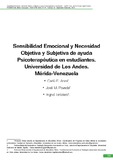Mostrar el registro sencillo del ítem
Sensibilidad emocional y necesidad objetiva y subjetiva de ayuda Psicoterapéutica en estudiantes. Universidad de Los Andes. Mérida - Venezuela
| dc.rights.license | http://creativecommons.org/licenses/by-nc-sa/3.0/ve/ | |
| dc.contributor.author | Arias, Carlú E. | |
| dc.contributor.author | Poveda, José M. | |
| dc.contributor.author | Tortolero, Ingrid del Carmen | |
| dc.date.accessioned | 2017-02-22T20:18:20Z | |
| dc.date.available | 2017-02-22T20:18:20Z | |
| dc.date.issued | 2015 | |
| dc.identifier.uri | http://www.saber.ula.ve/handle/123456789/43083 | |
| dc.description.abstract | La Sensibilidad Emocional es la capacidad para identificar rápidamente emociones, tanto propias como ajenas y reaccionar ante emociones expresadas por otros. Se consideran como dimensiones, la sensibilidad interpersonal positiva (SIP), sensibilidad egocéntrica negativa (SEN) y distanciamiento emocional (DE). El objetivo de la investigación fue relacionar los tipos de sensibilidad interpersonal con la necesidad objetiva y subjetiva de ayuda psicoterapéutica en estudiantes universitarios. Investigación de campo, descriptiva y transversal. Se aplicó la escala de sensibilidad emocional (ESE), el inventario de Goldberg 28 ítems (GHQ28) y el cuestionario de necesidad o no de apoyo psicoterapéutico en 284 estudiantes de la Facultad de Farmacia, Escuela de Bioanálisis, Universidad de Los Andes, Mérida (Venezuela). El 19% fueron hombres y el 81% mujeres en edades entre 15 a 34 años, con una media de 20,2 años. La dimensión predominante fue la tipo SIP con 61%, seguido del DE con 32% y finalmente el 8% la tipo SEN. Tanto en hombres como en mujeres predominó la tipo SIP con un 68,5% y 59,2% respectivamente. A su vez, el 79,9% de los estudiantes tenían GHQ28 negativo, es decir, no presentaban riesgo de alteraciones en su salud mental, mientras que 19,1% resultaron con GHQ28 positivo. Se concluye, que las personas con sensibilidad emocional tipo SIP se orientan en carreras que les permiten ayudar a otros. Los estudiantes tipo SEN y las estudiantes tienen un mayor riesgo de padecer alteraciones de la salud mental. Asimismo, los estudiantes tipo SIP y DE son más conscientes de buscar ayuda psicoterapéutica. | es_VE |
| dc.language.iso | es | es_VE |
| dc.rights | info:eu-repo/semantics/openAccess | |
| dc.subject | Sensibilidad emocional | es_VE |
| dc.subject | Salud mental | es_VE |
| dc.subject | Estudiantes | es_VE |
| dc.title | Sensibilidad emocional y necesidad objetiva y subjetiva de ayuda Psicoterapéutica en estudiantes. Universidad de Los Andes. Mérida - Venezuela | es_VE |
| dc.title.alternative | Emotional sensitivity and objective and subjective need for psychotherapeutic help in students. University of the Andes. Mérida - Venezuela | es_VE |
| dc.type | info:eu-repo/semantics/article | |
| dc.description.abstract1 | The Emotional Sensitivity is the ability to quickly identify emotions, both in oneself and others, and react to emotions expressed by others. Three dimensions that would be positive interpersonal sensitivity (SIP), negative egocentric sensitivity (SEN) and emotional detachment (DE) are considered.The general objective of this thesis is to relate the different types of interpersonal sensibility with the needs of psychotherapy in this thesis was evaluated the emotional sensibility of 284 students from Bioanalysis, of the University of the Los Andes in Venezuela. 19 % of the students were men and 81 % were woman, with ages between 15 and 34 years old, and a media of 20, 2 years old. 57.3 % the students were between 19 and 22 years old. The type SIP was the predominant dimension with the 60%, followed by the type DE with a 32% and the last one, type SEN with an 8%. As in men as women, type SIP was predominant with a 68, 5% and 59, 2 % respectively. The test of Goldberg 28 items (GHQ28) previous was applied, and as a result was observed that 79,9% of the students had a negative GHQ 28. They are not considered cases with risk of mental health disorder. We concluded that people with emotional sensibility type SIP could select course which allow them help others. Besides, students type SEN and women have a bigger risk of getting mental health disorders. The student’s type SIP and DE are more conscious of their necessities of psychotherapy. | es_VE |
| dc.description.colacion | 204-215 | es_VE |
| dc.description.email | carlu.arias@gmail.com | es_VE |
| dc.description.email | jyjy04@gmail.com | es_VE |
| dc.description.email | ingridtortolero@hotmail.com | es_VE |
| dc.publisher.pais | Venezuela | es_VE |
| dc.subject.centroinvestigacion | Centro de Investigaciones en Ciencias Humanas (HUMANIC) | |
| dc.subject.facultad | Facultad de Humanidades y Educación | es_VE |
| dc.subject.keywords | Emotional sensibility | es_VE |
| dc.subject.keywords | Mental health | es_VE |
| dc.subject.keywords | Studends | es_VE |
| dc.subject.publicacionelectronica | Revista Fermentum | |
| dc.subject.seccion | Revista Fermentum: Artículos | es_VE |
| dc.subject.thematiccategory | Artes y Humanidades | es_VE |
| dc.subject.tipo | Revistas | es_VE |
| dc.type.media | Texto | es_VE |
Ficheros en el ítem
Este ítem aparece en la(s) siguiente(s) colección(ones)
-
Fermentum - Año 025 - Nº 74
septiembre - diciembre 2015


